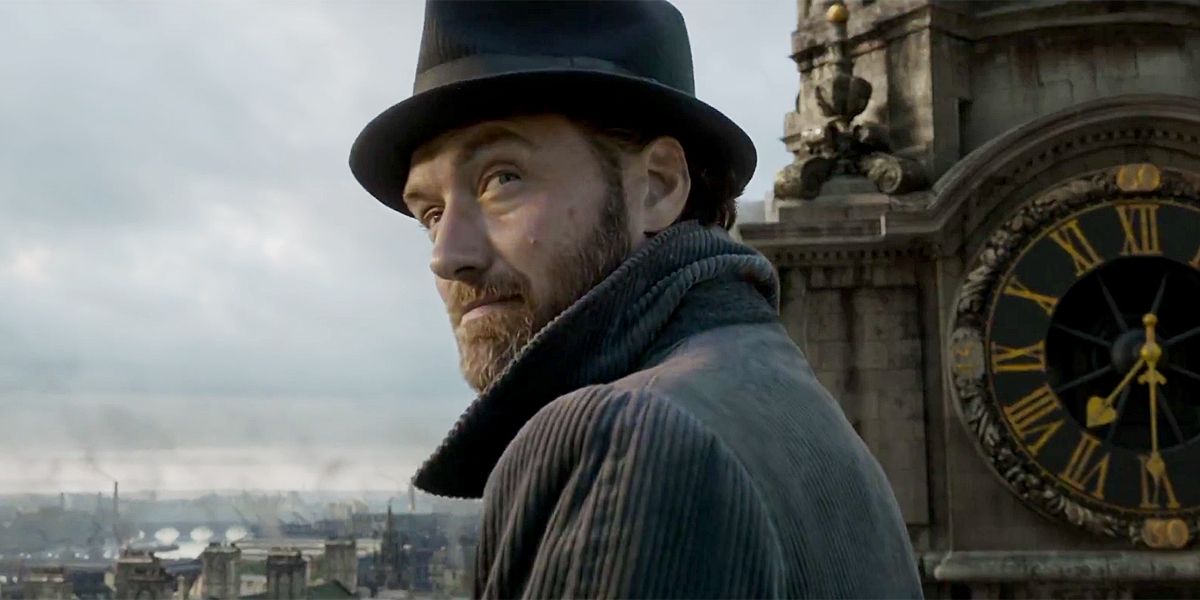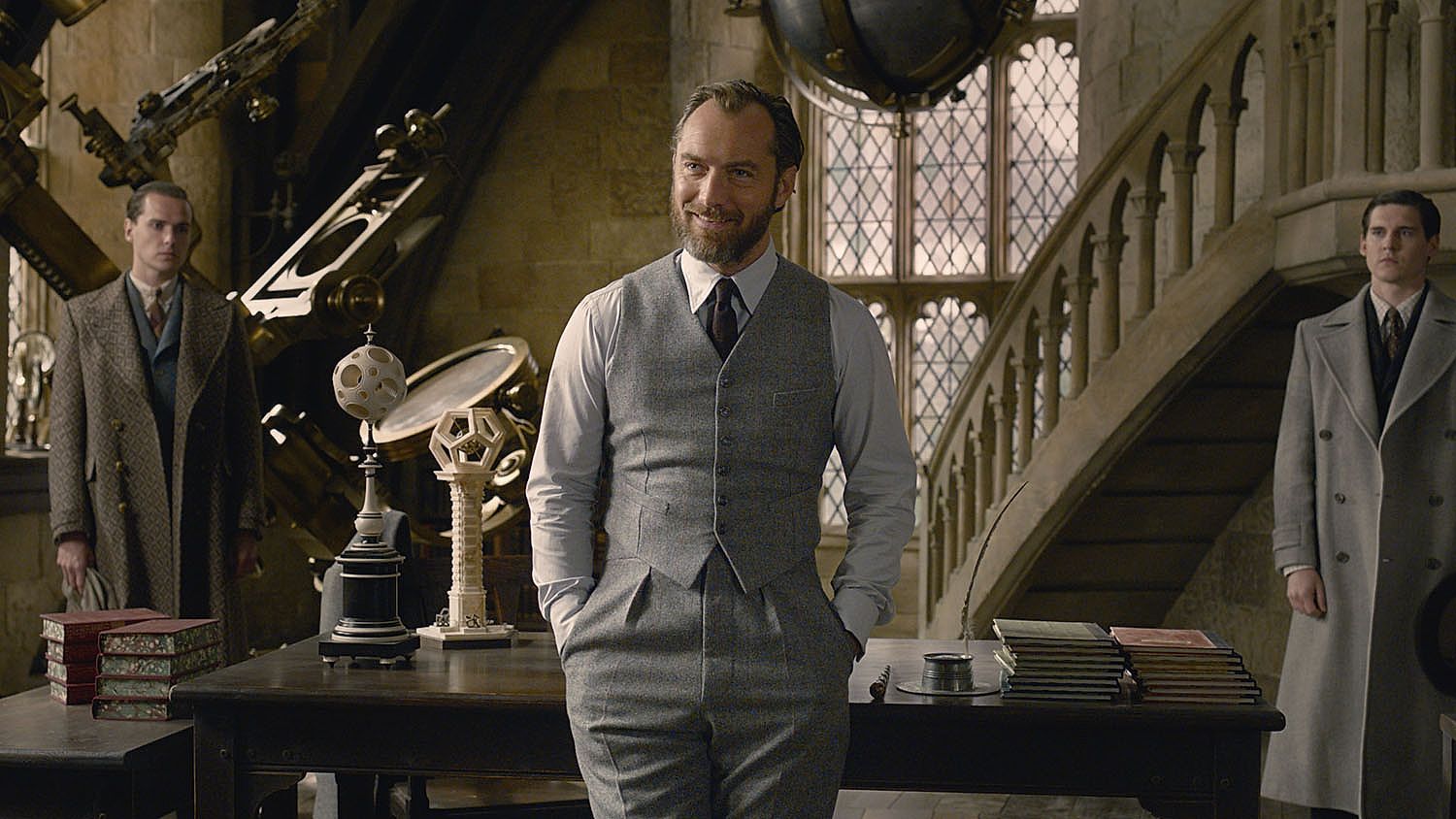WARNING: The following article contains spoilers for Fantastic Beasts: The Crimes of Grindelwald, in theaters now.
One of the big marketing focuses for Fantastic Beasts: The Crimes of Grindelwald has been the inclusion of a younger Albus Dumbledore, portrayed by Jude Law, decades before the professor would become headmaster of Hogwarts School of Witchcraft and Wizardry, as seen in the main Harry Potter novels and films.
Previously only name-dropped in 2016's Fantastic Beasts and Where to Find Them, the sequel has Dumbledore actually arrive on screen and appear sporadically over the course of the film, setting protagonist Newt Scamander on his mission to travel to Paris and attempt to thwart the machinations of evil wizard Gellert Grindelwald.
RELATED: Fantastic Beasts: The Crimes of Grindelwald's Ending Explained
While Law's portrayal of Dumbledore is certainly a welcome addition to the film, the character is largely sidelined during the proceedings; at times literally shackled from playing a larger role in the story while setting up the future headmaster for more to do in the inevitable sequels.
As Hogwarts' resident Defense Against the Dark Arts professor, Dumbledore is largely relegated to staying at the school alongside a younger Minerva McGonagall, teaching the next generation of witches and wizards. Dumbledore's role in the film is largely expository, tasking Newt with his quest in the film because he can't take the fight to Grindelwald himself, thanks to a mutual blood vow he and Grindelwald made decades prior, preventing them from harming each other. Outside of this, most of Dumbledore's appearances involve flashbacks and allusions to his history with Grindelwald, setting up a showdown between the two men in the future.
Harry Potter fans will recognize that Dumbledore and Grindelwald were actually in a romantic relationship in their youth. While this is strongly alluded to in dialogue and a sequence in which Dumbledore gazes into the Mirror of Erised, revealing his heart's deepest desire is to be reunited with his former lover, it is never said outright over the course of the film, which caused a bit of an uproar when news of the romance's omission became public at the beginning of the year.
While Dumbledore's romance with Grindelwald never being made official on screen certainly is a disappointment, much of the film teases that Dumbledore and his family, as well as Dumbledore's past relationship, will be explored in future sequels. The Crimes of Grindelwald is the second installment in a planned five-film prequel spinoff series, and Dumbledore's introduction in this film clearly establishes that the character will play an even bigger role as the series progresses.
REVIEW: Fantastic Beasts: The Crimes of Grindelwald Is a Dull, Convoluted Film
However, in addition to Dumbledore's academic commitments and blood pact keeping him largely sidelined, the film also notes that the professor has already roused suspicions in the Ministry of Magic due to his history with Grindelwald. The decision to keep Dumbledore's romantic history a secret makes more sense here, as he refuses to disclose the exact nature of his relationship with Grindelwald -- the relationship's end leading to the death of his younger sister clearly still pains the professor and he avoids revisiting it even under governmental pressure. This refusal to disclose his connection to Grindelwald and why he can't take up arms against him leads the Ministry to increase their surveillance of him while monitoring any magical activity he performs through restrictive wristbands.
By the film's final moments, as the stakes become stacked against our heroes and the battle lines are drawn, Dumbledore's reputation and spellcasting ability are both restored. Newt gives him the amulet containing Dumbledore and Grindelwald's blood vow, with the professor resolving himself to break the pact and join the fight. Meanwhile, Credence Barebone has been taken in by Grindelwald, who reveals to the young Obscurial that he is, in fact, Albus' long-lost brother Aurelius as he summons the Dumbledore family beast, the phoenix.
RELATED: Fantastic Beasts 2 Global Launch Predicted to Net as Much as $275M
These simultaneous developments ensure that Dumbledore will play a more central role in future installments of the Fantastic Beasts series, including a more extensive look at his family history and his relationship with Grindelwald, which is an exciting prospect. However, as a standalone film, The Crimes of Grindelwald will leave fans of Albus Dumbledore wanting more. Glimpses of the future headmaster throughout the film are its highlights, but it's unfortunately not enough to save the film from its weaknesses overall, nor does it give Jude Law's portrayal of the professor the time and attention it needs to truly thrive on-screen. A two-hour long setup for greater things to come, Dumbledore needs to be center stage after merely hinting at his larger role here.
In theaters now, Fantastic Beasts: The Crimes of Grindelwald is directed by David Yates from a script by J.K. Rowling. The film stars Eddie Redmayne, Jude Law, Johnny Depp, Katherine Waterston, Alison Sudol, Dan Fogler, Ezra Miller, Zoë Kravitz, Fiona Glascott and Callum Turner.


